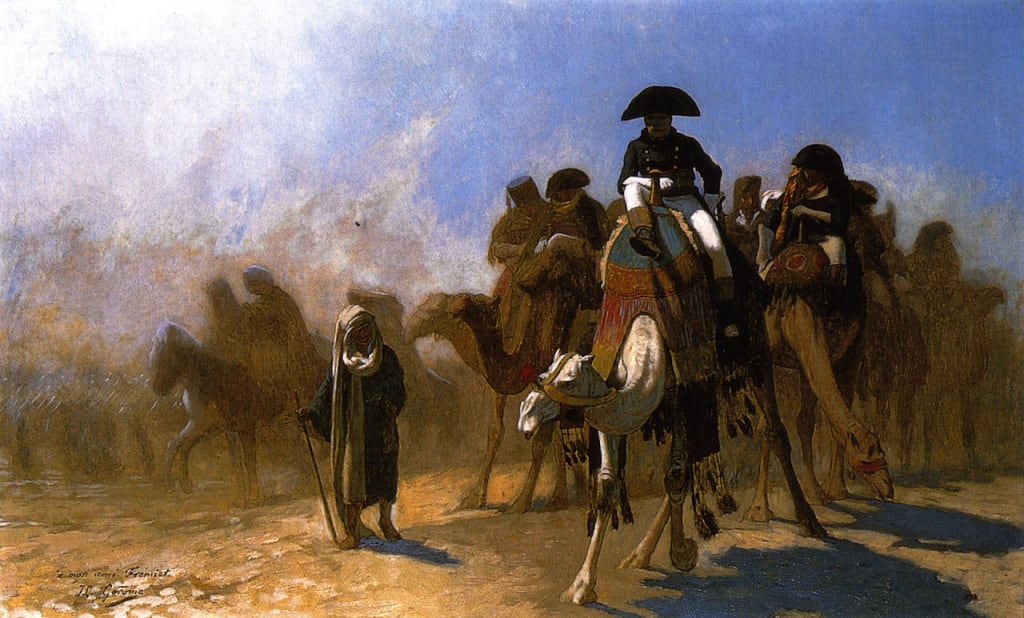Napoleon in Egypt
The Emperor's Campaign in the Ancient Land of Kemet

After substantial military victories for France over the Austrian Empire in Italy, a 29-year-old General named Napoleon Bonaparte decided that conquering Egypt would help in France’s war with England by blocking trade from India to the island nation. Napoleon was clearly inspired by his hero Alexander the Great who had conquered Egypt millennia previous.
The rulers of Egypt at the time were known as the Mamelukes. They were the descendants of former slaves that were brought in from the Caucus mountains who revolted and took over long before.
Napoleon and his fleet of ships carrying not only his military army but a large contingent of scientists, engineers, and artists landed in Alexandria in July of 1798. His continental European army with their woolen jackets were unaccustomed to the desert heat and scorching sun of Egypt in the summer. Many troops died on the long march south from Alexandria to Cairo.
When they finally met up with the bulk of the Mameluke army it was in a place called Imbaba in a melon patch. Even though the Pyramids of Giza were miles away and barely visible, Napoleon named it the Battle of the Pyramids and told his exhausted troops; “Forty centuries of history are looking down on you.” They formed up into their Square Formations that they were used to fighting in and were able to route the defending army handily.
The victory was relatively short-lived, however. Napoleon, more of an army than navy man, had left his fleet in an awkward position in Abukir Bay. When the English commander Lord Horatio Nelson caught up with them he broke with some traditional conventions and didn’t wait for the next morning. He committed to a spontaneous battle and was able to come up from behind the French fleet, catching them unawares. The French fleet was destroyed including The Lauriant which was the largest ship in the world at the time. The explosion could be heard 50 miles away and was so powerful that the battle stopped for 10 minutes. This cut off the supply lines for Napoleon and left him effectively stranded in Egypt.
Napoleon was always a master of propaganda used this opportunity to promote his founding of a Scientific Institute with all the scientists, artists, and engineers he brought with him. He sent out the academics to study practically everything all over Egypt. They chronicled monuments and works of art. They even found a whole Western section and the tomb of Amunhotep III when they were drawing plans and maps of the Valley of the Kings. Napoleon himself never went to the Valley of the Kings, nor did he climb the Great Pyramid although he did go into it. He had his men leave him alone in the Great Pyramid. When he came out, he refused to talk about his experience saying that no one would believe it. He was close to telling someone about it when he was close to death but took his experience to his grave.
The rest of Napoleon’s time in the region was problematic at best. He put down a revolt in Cairo in a culturally insensitive way, which helped to set up troubles later on. He led a campaign further north and east towards “The Holy Land” because of peoples gathering forces against him. He sacked the city of Jaffa. In Jaffa, his soldiers behaved in ways unbecoming of honorable soldiers. His campaign continued to Aker and facing a man named Jezzar Pasha. Jezzar’s nickname was “The Butcher.” He had the English fleet supplying his city on the water side and a wide moat in front of a massive wall. Jezzar lived up to his moniker and Napoleon was forced to retreat, suffering his first, true loss.
Napoleon was able to continue his mastery of “spin” and made it seem like the campaign was successful. Shortly after he left Egypt forever without properly telling anyone. When he sent word he proclaimed that news from Europe forced him to leave. Shortly after that, he took over France, proclaimed himself Emperor, was beaten and exiled, rallied a comeback, was defeated, and died later in his second exile.






Comments
There are no comments for this story
Be the first to respond and start the conversation.